#also i have sensory issues triggered by heat
Explore tagged Tumblr posts
Text
The Summer fan's idea of fun:
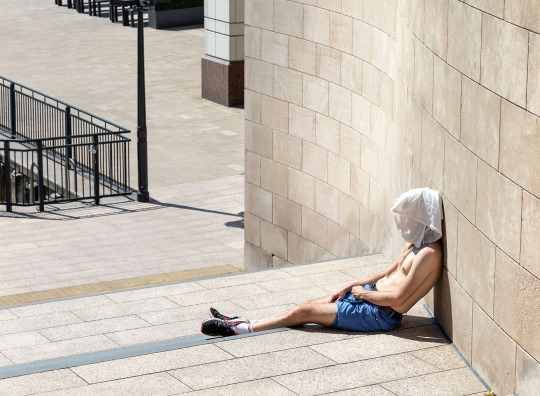


An average Autumn enjoyer's everyday views:







#one of these things is not like the others#should i tag for gore?#even though its a silhouette and very fake?#autumn#october#halloween#summer slander#I don't actually hate summer I just think it being seen as the best time of year is a result of the industrial revolution#favtories had to close so workers didnt pass out from the heat and as time went on that was taken adventsge of by travel companies#anyway i actually just hate bugs and theyre onlt around in spring and summer#also i have sensory issues triggered by heat
20 notes
·
View notes
Text
My genuine reaction to my mom deciding to neglect me because she has a friend over :

More venting below the cut , I ' m sorry , I ' m very stressed out
So our mom ' s friend , who I ' m going to call M , came over last Friday and has been here since . Ever since she showed up , she has been making things difficult for me .
Firstly , she decided that the fan in the room she was staying in wasn ' t good enough for her . So , instead of telling this grown adult woman to tough it out or maybe suggesting that she sleep in the living room where the AC is , our mother takes our fan out of our room and gives it to her friend instead . For context , we are a naturally very warm person . We have very high body heat , and we need a fan on us. Otherwise , we sweat a lot , and we are unfortunately very susceptible to sweat rashes . Despite being fully aware of all of this , our mom stole our fan from us anyway and gave it to M , leaving us with a fan that we could not feel even when it was less than a foot away from us . Since M has gotten here , we have formed a total of 4 separate sweat rashes .
On top of the whole fan situation , our mom has also been neglecting to feed us . This isn ' t refering to her not cooking for us as we are capable of doing that ourselves , but she just has not been buying us food . She has only been buying foods that herself and M enjoy , and unfortunately , a lot of those foods trigger sensory issues for us . On the other hand , even if I was able to eat the foods they were buying , I would not get the chance to because they have been so quick to eat any foods they purchased . There has also been a time where even THEY ran out of food because of how quick they are to eat everything they purchase , and instead of getting food for all three of us , our mom bought two meals , one for herself and one for M . All she bought for us was a single medium carton of chocolate milk .
Because of M being here , I have been limited to one single meal a day , and maybe a snack if I ' m lucky enough for my mother to order something for me . There ' s been days since M got here where I haven ' t even been able to have that one meal .
They have also drank all of my juice , they have eaten my stashed away snacks , I have nothing here to boost my sugars with which sucks because I have blood sugar issues , and our mom won ' t tell M to leave because " she needs company " .
Part of me feels guilty for complaining so much about M ' s presence , but I am barely able to eat because of her . I can ' t even ask our mom for anything because M tells her that I am " pushing her around " and tells my mom that she shouldn ' t listen to me . M has been encouraging our mom to pretty much leave us for ourself even though we have genuinely no way of getting food for ourself . We do not have our own money and we can ' t buy anything for ourself because again , we DO NOT have money .
I wish M would just leave . It has almost been a week , and I ' m tired of having nothing to eat and not being taken care of whatsoever because our mom is too busy focusing on her friend .
6 notes
·
View notes
Note
20
20. favourite things about the night?
The quiet. The peace. The way things settle, slow, soothe into a softer and gentler rhythm.
The way the heat and humidity drop, reducing sensory overstimulation and encouraging me to go outside while (after a certain hour) also meaning the insects that I react badly to are far less likely to be around to bite me. (I have borderline allergic reactions to certain insect bites, including mosquitoes, and while I recognize they are part of the ecosystem I also try to limit my exposure both to them and to pesticides/insect repellants as much as possible.)
The release of immediate constraints and deadlines (see also: "revenge bedtime procrastination"), freeing me from the need to be "on" in a social sense or worry about someone checking in on me and my progress, so I am more likely to pursue both personal and externally structured goals.
Being able to walk Sadie around our neighborhood without fear of other dogs, or random pedestrians, or motorcycles whizzing by at peak hours.
Related: the knowledge that if Sadie does react to something while we're on a walk, it's a legitimate issue, there is Something There, because she doesn't bark at nothing, and in the dark I can trust her instincts and senses over my own vision (vs the daylight, where I generally rely on my own reaction and perception to intercept triggers before she can react to them).
Being able to enjoy the outdoors in peace and stillness in a way that's not always possible during daytime hours.
The soft susurration of crickets and cicadas and frogs; seeing bats and night-flying birds dart about in their regular pursuits and hearing their noises as they go.
Watching lightning bugs/fireflies dance over any open space available, during the few months they are around.
The ability and freedom in all seasons, since I live in a relatively rural area, to step outside and (to paraphrase Walt Whitman) wander off by myself, in the mystical moist night-air, and from time to time, look up in perfect silence at the stars.
Thank you so much for asking!
[Questions I think it would be fun to be asked]
#LadyTem's ask box#about the author#a tag of important things#how rare and beautiful it is to even exist#dandelion break#seeingteacupsindragons
2 notes
·
View notes
Text
CCQ's Tips for Showering
I'm physically & mentally disabled & these are some things that have helped me with showering & some more general hygiene things.
-use a shower chair or stool
-long scrub brushes for your back & legs & anywhere else you can't reach
-grab bars/railings can be so helpful (and keeping a waterproof cane close by too)
-pivot transfer mats or transfer boards or one of those shower chairs that has a bit that sticks out of the tub to make transferring easier
-if you choose to shave, doing it with electric razor in bed
-unscented soaps & shampoos
-leaving caps of your soap bottles unscrewed so you can open them on your own
-flexible removable shower head on a hose
-if you're short like me & your feet dangle from shower chair even on the lowest setting, a plastic stool under your feet can make it much more comfortable
-grippy mat on tub floor to decrease chance of falls
-using the bathroom right before shower to decrease the chance of incontinence (mileage may vary depending on your particular situation)
-keeping all soaps & things in easy arms reach from the shower chair (there's baskets that adhere to the side of tubs ive found helpful)
-laying towels over yourself if being undressed is triggering for you (especially if someone else is helping you in the shower)
-this is personal preference but i like having a towel on my wheelchair so it isn't as bad of a sensory issue when i get out (and keeps my chair dry)
-play nontriggering media or media you know will keep your mind occupied (if it won't distract you to where you can't remember what you're doing)
-hang a laminated page of the steps of showering (however detailed you need to be). i haven't found a good way of marking off yet where i am in the process, but even still having it has been helpful to remind me what needs doing
-if you hurt from cold, using a space heater to warm the bathroom before shower time can be helpful
-leaning your head forward and resting your elbows on your knees to wash hair
-prioritize. i always do pits & privates first in case i start struggling too much physically or mentally & need to get out before i'm all the way done.
-having a shower day & no expectation of anything else getting done. that's thursday for me. it gives me a day i know will be for shower & the rest of the week (especially physical tasks) i plan around shower day. this also helps me plan infusion set changes (i don't like using sets that have gotten wet)
-laying a chux pad on the bed (over or under a towel depending on your preference) if you don't like putting brief on while you're still damp
-having a nice little reward planned can be nice. usually for me that looks like laying in bed & watching one of my favorite shows. nice to have something to look forward to for after
-also for after, if you get that bone cold hurt after showering, a heated blanket can help some
-if you have someone in your life you really trust, you can ask them to help. you can also hire an aide to help you
When I can't shower:
-no rinse soap is a lifesaver. i like whatever that generic pump one is from walgreens. baby wipes work okay, but not as well in my experience
-no rinse shampoo too. i've had the best luck with the cap types
-bidet on the toilet if you can swing it
-deodorant that works with your body chemistry
-clean clothes can go a long way if you can manage changing (or learning how to dress/undress without being uncovered, i usually put the new shirt/dress on over the old to stay covered)
I'm probably forgetting some things. If I remember anything else I'll update this list. Stay safe everyone 🤍
10 notes
·
View notes
Note
Ok, I've sent a version of this question to @mareenavee for writerly stuff, but figured I'd adapt it to the arting process and then come pester youuuuuu. Though feel free to answer it in writing mode too, just pick whichever you want to ramble about more :> 1. What are the (art and/or) techniques you're most comfortable with? What comes easily and naturally and just flows (and how come?) 2. What's the stuff that requires lots and lots of redos and revisions? What challenges you as an artist? 3. What do you want to try your hand at, but haven't yet?
Yes, art process asks! We're doing that now!
What are the (art and/or) techniques you're most comfortable with? What comes easily and naturally and just flows (and how come?)
My comfort zone is portraits. Drawing people is easy (relatively speaking), and as much as I complain about it, I do enjoy and have become semi ok at faces and hands in general. I don't know if anything flows (I have poor hand-eye-coordination so it's a bit of an effort on my behalf to do anything precise but I'm clearly a masochist and choose to do precise work) sketches take like 3 hours and lineart takes 1-2 so yeah...slow. I think painting flows best if I'm listening to music, easier to zone out/hyper-focus enough to resist distraction. Skin and hair are the most relaxing to paint (even if I complain about it, I just kinda complain).
Digital is something I fell into because I had Photoshop loaded onto the home computer (ye old 2008 lounge room computer box) and traditional mediums were giving me eczema and/or making me dizzy and triggering headaches so I switched around age 15 and haven't really used many traditional mediums since... No wait, graphite, I'll use that but it's been a time. I am most comfortable with digital. Plus I hate the feeling of stuff on my hands, sensory issues apparently.
My painting technique is kinda similar to both oils and chalk pastels (pastels being my mum's medium, so I picked up a lot from that) like a weird hybrid between the two applied digitally I kinda just pulled from a lot of things and found what came easiest for my process.
What's the stuff that requires lots and lots of redos and revisions? What challenges you as an artist?
Oh boi, this is where I get called weird... (for personal work) I don't do working drawings or thumbnails or studies, I don't do warm-ups and I don't revise sketches. I have a crystal clear image that appears in my head of exactly how I want the finished piece to look, sometimes it's informed by a reference sometimes I have to make one that fits. I know exactly what I need to do to get it to look like that image. That includes lighting and colour that I add at the end, I paint cold and turn the heat up at the end. It's easier on my eyes. I do revisions when I'm doing commissions and professional art, it's a collaborative project and I'm creating someone's vision for them (which I also enjoy). I'll make edits within reason, there's a cut-off point that no one has ever reached but it's 3. I can create to a brief pretty well after 12 years of client work.
Challenges would be backgrounds and scenes, I'm working on those so that they are no longer challenges.
What do you want to try your hand at, but haven't yet?
I want to make something out of clay, a little Horus replica broach.

Like this Ptolemaic Falcon Faience Applique but with more Horus symbology. One day!
11 notes
·
View notes
Note
I could be wrong but you’re autistic right? I am as well and the heat regulation thing can be part of that
I had no idea that was an autistic trait! Yeah! That's absolutely part of it! I've got several of the traits listed in that post and have always been sensitive to heat. I've come to realize that the sun's intensity and light also end up triggering like sixteen different sensory issues. I just didn't realize this was happening until maybe two years ago.
I experience extreme dissociation. I can leave my body like a motherfucker. Taking ketamine was just a step up from what I've done without problem for years. For years I thought my pain tolerance was just unreasonably high. No, I just hyperfocus and ignore it. If I remember back far enough, I remember not living this way until school started, which makes sense to me: i had to learn to endure uncomfortable situations of every kind, and being a chaotic gremlin backfired on me constantly, so I learned to hyperfocus really hard on schoolwork, which i liked, to the detriment of every other sensory experience. I have sat through eye-stinging smoke for idk how long before I realized I was in pain. I have been stung by the tarantula hawk and was merely mildly perturbed. On the milder side of things, i can't smell very well--I've never been able to that i can remember--until I started taking THC. Now I can smell better. And I hates it!!!
The minute I became aware of my constant dissociation, I started attempting to reconnect with my body, and this has ended up exacerbating every physical experience you can imagine. The summer--which before I merely disliked--has become unbearable to me in every conceivable way: too hot, too bright, too intense. The city is too loud. Textures are too textured. Clothes must be just so. And then there was the wild realization: am I really asexual or am I just ignoring cues?
So I'm having a great time rn long story short
I'd like to hear your experiences if only to figure out how I should be coping, besides holing up in the dark lol
3 notes
·
View notes
Text
It took me a while to figure out that my bipolar disorder mood swings, particularly to mania were caused by stuff more closely linked to my being autistic than bipolar.
All the support group stuff was focused on stressors and whenever I suggested stuff, they said I didn't understand what they meant - they didn't mean getting overwhelmed by sensory stuff (granted I just listed the sensory things didn't explicitly say overwhelmed since we were just making a list so I thought that bit was a given), they meant actual stressful things. Or stuff that causes anxiety in general. None of the stuff I listed "counted" as bipolar triggers.
Wasn't until I had a massive meltdown in one of the sessions (including S.I.B) that they considered that something else might be going on too. And then they realised that yeah, maybe for me my stressors aren't ones NTs would experience as triggers for their mood episodes, but given the difference in brain wiring they very much are for me.
And the fun bit is there's only so much you can do to control for sensory sensitivities. Like the sound of the boiler running is a massive issue for me, however I can't wear ear defenders to block out the noise because they press on my glasses too much which causes a different bunch of sensory issues, they amplify the sound of my blood rushing through me which is also a Bad Sound, they don't fit right so need holding on to stop them falling off (I'm an adult with a tiny head so they don't fit). Can't do earplugs due to the blood rushing sound, plus my EDS causes my ear canal to collapse under the pressure so it feels like something trying to suck my brain out through my ears... And can't just not have the heating on when needed because I have Reynaud's Syndrome and it really fucking hurts to have your extremities respond like they're trying to save your life in the arctic by cutting off blood flow. You know, how you might lose a finger or toe, but if it keeps your core warm to do that, you might survive the cold. Except in my case my body does that when the temperature drops below 24C and/or there is a breeze which my body can interpret as cooling temperature. So it can even happen when its 30C+.
But what has helped was me trying CBD oil. I'd read some journal articles on research into using CBD oil to help with bipolar disorder because it can act as both an antidepressant, but most importantly like an antimanic agent too. There were also studies on it helping with anxiety. So since I'd had bad reactions to every med I'd been trialled on for bipolar disorder and was kinda running out of options I thought it was worth a try. And the psychiatrist I saw at the time thought it was ok to try as the doses were so low in what you can buy as "food supplement" that it was unlikely to do anything negative and he felt it might not do anything positive, but like no harm trying.
And its helped me massively. Haven't had a single manic episode since taking it (used to have them very frequently as I rapid cycled) and my depression is limited to a day or two before my period when my hormones understandably get out of whack. And its pretty minor. Just get a bit teary. Which is a drastic difference from sleeping for days at a time almost (just toilet breaks) and wanting to kill myself constantly.
But what I didn't expect was how much it has helped with my sensory issues due to being autistic. People have likely seen that video of someone going into a shop which was saying you could take CBD oil to help with autism to have a yell at them. Well guess what? It can actually help! Does it make me not autistic? NO! But what it does do is raise the threshold that has to be reached before a sensory bad thing tips over into sensory overload. Am I at neurotypical levels? Still a big NO! But it feels like it slows down the signals coming in just enough that its way easier to process them as opposed to having such a massive wave of sensory input to try to wade through all the time. Still disabled, just a bit of a nicer time trying to cope you know?
Its made it easier to interact with other people too. Like before taking it, if my partner was eating something in a way that was making Bad Mouth Sounds, it would send me straight into overload & I'd either respond angrily, or meltdown or similar. Now I hear it, it still irritates me, but there's enough buffer to process "oh this is a Bad Sound, what can I do about it? Oh I could let partner know so that they can try to chew quieter". And then I'm able to actually communicate that calmly enough that it doesn't seem angry or rude. How do I know its not just that I've learned some other coping mechanism? Well I had a week without taking any CBD oil due to it being out of stock for a bit so I ran out. Guess what came back with a vengeance? That's right! My sensory issues in all their horrible not-glory. Right back to tiny amounts of Bad Sensory Thing causing a tip straight into meltdown or shutdown. And I may or may not have exploded at my partner for chewing something a bit louder than normal. They were eating a pack of crisps downstairs and I yelled at them from upstairs to shut up with how loud they were crunching on them. Except less politely because I couldn't figure out the words.
one of the things that makes autism a disability (and why some of us choose to label it as such rather than an “alternate neurotype”) is the stress.
part of autism is just being incredibly stressed. overstimulation? stress. holding a conversation? stress. something happening to our schedule? stress. people talk about how often autism is recognized and diagnosed via our stress responses (like meltdowns) because it is just so common to see autistic people stressed because of lack of accommodations to how our brains work.
and this matters because stress kills. stress causes a lot of health issues, or it can trigger pre-existing ones by making certain chronic conditions flare up. i once had a psychiatrist very unhelpfully tell me i “just need to manage my stress” when the stress i was describing was things i could not avoid in neurotypical society and can’t “just get over”. i can do “self care” all i like but i cannot at the very base level change the way my brain inputs information and reacts accordingly.
44K notes
·
View notes
Text
possibly the weirdest bout of horny so far, idk what was going on bc i wasnt intending to try to convince my husband to have sex he was waking up from a nap and i just came in to hang out with him. but i was very horny and we tried a bit where he was like "you try to turn me on and well see where it goes" and it didnt go well because i have that big insecurity issue lately and i kind of turned it into a silly mood (a coping mechanism i use a lot whenever i experience shame) and he didnt mind that it didnt work but it sent me spiraling
problem was i was still horny despite the depression and only getting hornier, i told orin "it feels like im in heat, oh my god this is what it feels like for ferrets when they dont get fixed THIS IS WHY THEY DIE" and i didnt mean to but i think i made him feel like he sort of had to relieve me (i talked to him about it afterward he said he did also want to experiment with the "breeding" thing and used it as an opportunity) and it was weird because i didnt care about getting off literally at all, like my husband brought me my bullet and i told him it wouldnt help i JUST wanted to get penetrated
weirdly as i was getting worked up i asked him to fondle my chest (something i do sometimes but fairly rarely) and play with my nipples, something ive NEVER let him do because i have this thing where whenever my nipples get stimulated (even accidentally by wearing a towel for too long or something) i get a really weird really negative feeling, and recently i havent dealt with it as much because i think my nipples sensitivity has gone down on T but he managed to trigger it and like, so the feeling i get from them is something i tend to describe as "feeling violated" but weve been talking about CNC a lot lately and so i kind of just decided to lean into it
then of course it got him turned on and he walked me to the other room, bent me over, pushed my face into the bed and made me scream, using a condom this time so he could cum inside me (an uncommon method in this household even in the context of rare penetration)
and then i cried for probably the first time since ive started T, and immediately got a headache even though i didnt finish (i get a headache after i orgasm like 90% of the time) not because it was bad or it hurt i just do that whenever we go a little rough sometimes?? idk i think its just a sensory thing it has no correlation with my emotions
but i DID feel kind of weirdly dysphoric afterwards, i think obviously the boob stuff contributed but i feel like going ferret mode felt kind of bad... it was just very FEMALE feeling yknow, like ugh why do i feel comparable to something that wants to be bred (i dont think breeding is actually a real component for us anyway even if it were pretend)
but i think it reminded me of how i felt when i got really horny as like a teenager, or an early adult and having like baby fever and stuff. theres something about just being made slave to your hormones that SUCKS and i mean i know my hormones arent FEMALE hormones anymore so i shouldnt associate the feeling with being female but it was so weird idk.
0 notes
Text
Tips for age regressors with chronic pain
As a regressor with arthritis I know how difficult it can be to be small, especially on days where your pain is extreme. These are some of the things I’ve learned can help me. I know there are other posts like this, but I wanted to share my experience and tips
💚 make sure to listen to your body ! 💚
I know it might seem obvious, but it’s hard sometimes ! If your hands start cramping up, remember to take a break from drawing/writing ! If your body starts to hurt while your out , make sure you go home or ask your cg to go home ! I know it’s sad when your having fun but there are fun things to do even when you’re hurting, try watching a movie or playing with stuffies !
**Remember that over the counter medications exist, if they help you take advantage of that !**
🦖take a warm bath🦖
baths can help receive pain and relax the body. Put some salt in the bath (if you cant take hot baths because of sensory issues, dissolve salt in hot water, then pour into a bath that is an acceptable temperature) . Make it fun ! add bubbles, add a bath bomb, and don’t forget the bath toys ! watch a movie or show while you soak
💚get cute heating packs :D 💚
I tend to slip a lot easier when I’m in pain, so I like to keep some cute heating pads on hand to cheer me up ! Here are some good ones I’ve found:
( $$$=25+ $$=15+ $=under 15)
🦖warmies $$ - $$$
🦖sheep $$
🦖thermal-aid minis $
🦖cat paw $
🦖teddy bear themed $$
🦖frog themed $
🦖strawberry themed wrap around $
🦖 forest creature print $
you can also fill a sock with uncooked rice and microwave that !
🦖 do some fun stretches 🦖
of course only do this if you feel up to it, but stretching can be really fun, easy, and can relieve pain ! here’s some easy ones to do while small

source
💚do some limited movement activities 💚
If pain is a trigger for your regression, or if you just want to regress while in pain, I know it can be a scary thing. But if you feel okay enough, try to do things that can make you happy, your small space can be full of so much joy so take advantage of that !
if your hands don’t hurt too bad, you can:
🦖play video games
🦖play on your phone
🦖colour or draw
🦖play with your stuffies
if your hands do hurt you can:
💚put on a comfort movie or show
💚cuddle with stuffies or a cg if you have one
💚take a nap
💚listen to some music
💚call someone
🦖 set up a reward system for taking meds 🦖
It can be hard to remember your meds, but you really do need them ! I personally have a sticker chart at the beginning of my agere journal, and I get to put a sticker down whenever I take them ! This not only helps me remember , but also gives me an incentive to take my medication !
💚 let it out 💚
Regression can make emotions and pain feel big and scary, especially if you’ve involuntarily regressed it can be really really scary. You’re allowed to be sad, even (and i’d say especially) when you’re small. If you’re not sure how to let your emotions out you can always:
💚cry
💚write about how you feel
💚vent to your stuffies
💚vent to someone you trust
💚scream into a pillow
You’re feelings are always valid , don’t discredit them . You are so loved , you deserve to feel ok .

#agere#age regression#sfw agere#agedre#age dreaming#sfw age dreamer#age regressor#sfw age regression#agere tips#agere positivity#agere blog#agedre blog#petre#sfw petre#pet regressor#pet regression#chronic pain#chronic illness#sfw interaction only#sfw agere blog#cheez-its agere
1K notes
·
View notes
Text
I'm gonna double down on the shower chair recommendation! It's also good if you have orthostatic hypotension or vasovagal syncope. They're very good to have if you get lightheaded easily and need to sit down with very little warning.
(Please be warned that heat can open your blood vessels, which can cause your blood pressure to drop! This can cause dizziness, disorientation, difficulty thinking, trembling, weakness, and nausea. I'm not saying ban yourself from hot showers, but please be prepared to take care of yourself if that might cause an issue. If you need to raise your blood pressure, and if you're able to, turn off the water and lay down on your back, with your legs straight up against the wall. This makes it easier for your heart to get blood to your brain and vital organs, raises the oxygenation and blood pressure around your brain, and thus helps prevent you from passing out. This can also help with POTS and general fatigue.)
Also, for stomach conditions: I don't want to go into details, but have a container within easy reach just in case an emergency happens while you're in there. A little preparation can save you a lot of hassle.
Those showerheads with adjustable positions and outputs are also really good if showering triggers sensory processing issues. I despise both high flow rates and low flow rates, so I need one with like 5+ settings so I can figure out which one doesn't sting or tickle. If you really don't like the showerhead, consider looking into sponge baths and only use it to rinse off at the end. A handheld shower wand might be easier for controlling the sensory experience than a wall-mounted one.
Tips to make showering easier when you are physically disabled:
Since every list titled something along the lines of “top 10 tips to make showering easier for disabled people” is only helpful for mental disabilities and is barely anywhere near useful when it comes to physical disabilities, allow me to introduce you to my list of “tips to make showering easier and less painful for those with physical disabilities”
Shower chair/stool: this allows you to sit in the shower without having to sit on the floor of the tub, which can be a difficult position to stand up from and can just cause more pain, especially in knees. They're relatively cheap on Amazon
Install railings and grab bars: these can help getting in and out of the shower, as well as help to stand up if you decide to sit. Alternatively, if you fall, there's a chance you can grab one and save yourself from hitting your head or otherwise seriously injuring yourself
Use the hottest water you can stand: heat is good for pain treatment, especially when it comes to muscle pain. Just remember that the hot water doesn't last forever.
Changing tables or low shelves: having all your needed things available to you at a level that you can reach easily while sitting and also does not involve reaching up as much is always good. You can have stands placed in your shower for hair products, body wash, etc, and/or small tables just outside the shower/bath that you may need but don't want to get/ can’t get wet
Give yourself a lot of time: if you can, plan your showers for times when you will have a lot of free time, both so you can take your time in the shower and so that you can give yourself plenty of time to rest after the fact. Especially helpful for those with chronic pain and/or chronic fatigue
Drink water!: before getting into the shower, drink lots of water! The heat will dehydrate you and make you light headed, so make sure you are properly hydrated beforehand. If you’re like me and you’re prone to dehydration, bring a cold water bottle into the shower with you. Bonus points if it's insulated so now matter how heat and steamy the bathroom gets the water stays nice and cool. Also make sure to drink cold water after getting out of the shower too
Have places to rest your arms and lean: if you can't keep your arms raised for very long, make sure you have places to rest your arms and/or elbow while washing your hair/body. Could be shelves you install, the edge of the showers built in shelves, the faucet or tap, etc. Alternatively, if you sit on the floor of the bathtub you can lean your head back and rest your elbow on the sides of the tub
Keep a dry cloth just outside the shower: it's often easier to use aids like handrails with dry hands, so keep a small dry cloth or two just outside the shower, easily in reach but where it will stay dry. Use it to dry off your hands so you have a better grip. Can also be helpful if you have soap dripping towards your eyes lol
Mindfulness: I KNOW, I KNOW! Trust me, I know. I despised the idea when it was brought up to me. First heard about it in my DBT group and figured it would be no help, especially for my chronic pain. But honestly, allowing yourself to focus on anything outside of your body is great. Focus on the sound of the water. Focus on the feeling of the water raining down on you. The feeling of the water on your skin. It can even be helpful to focus on and allow yourself to feel the pain rather than trying to distract from it or hide it
Lie down right after your shower: as soon as you get out of the shower and dry off just a little, lie down. I personally find this especially helpful for my back and shoulder pain, as after sitting or standing the muscles and bones can feel tight and compacted; lying down gives your body time to decompress.
Time your shower with your pain meds: time it so that you go into your shower right around when your pain meds are kicking in. For example, Advil typically takes 30 minutes to kick in, so plan to shower 30-45 minutes after taking some. Same with any other pain meds you take
Please reblog and add your own!!!!!!! lets compile a whole long list of tips and tricks to make our lives easier!
#signed: someone with both horrible orthostatic hypotension and a long history of vasovagal syncope. And also lifelong stomach trouble.#I was going to write something about ADHD and keeping everything in One Spot so you don't have to remember multiple spots#but this is about Physical Disabilities so I'll save that for another post.#tips and tricks#disability#showering
2K notes
·
View notes
Text
Furuba autistic headcanons
With it being April, or autism acceptance month, I wanted to finally drop my list of characters from Fruits Basket that I read as autistic! This is based a lot on my own experience, as well as that of other autistics I know or have seen talk online. I hope some people can get something out of it, feel free to tell me what you think 😊, though please refrain from getting upset that I would dare suggest your fave is autistic.
Hanajima
Before becoming able to better control her powers, she would be constantly overwhelmed by the things she heard to the point that she couldn't even really go out in public. This reads a lot like sensory overload.
Constantly picked on in school because other kids thought she was weird. Eventually reclaimed this weirdness and turned it into a whole persona.
Seems to talk usually in a relatively flat tone.
Had trouble socializing with no friends outside her family until middleschool.
Has a very funny, dry sense of humor that I find very similar to a bunch of autistics I know, including myself.
Hatsuharu
Listen. You have seen the funky little man, you have seen the way he talks, the way he acts around others. He is, and I mean this in the best way, a weirdo. I do not know how you could look at him and see a neurotypical.
Once again, like Hana, Haru is funny in a way that feels very autistic.
Very flat, dry, tone delivery. Sometimes just Says Things that make everyone else go huh??? Suuuuper blunt. Doesn't emote facially a lot of the time.
When this man sees a social norm he doesn't get he WILL NOT follow it. Pierces his ears just because his hair got flak, defends Momiji wearing whatever he wants because sometimes y'know the social rules are just dumb and don't make sense. Especially dress codes.
Sometimes says things not befitting the current tone of the situation.
Represses (masks) a lot of his emotions, leading to outbursts that seem uncharacteristic.
His main childhood trauma revolves around adults branding him as "dumb" and ridiculing him. Haru, however, is super smart and wise!! Just in an offbeat way that not everyone may get.
Machi
Reads as very "flat" emotionally to the point that others would call her boring. Also has a flat vocal delivery.
Relies on specific habits or ways of doing things or else she gets super upset (her hatred of imperfection.
Has trauma surrounding adults completely misconstruing her intentions and thinking she's doing something malicious when she's not.
Generally behaves in a way that's hard for others to understand, one of her formative moments with Yuki was him saying he wanted to "see how the world looks" through her eyes.
Once again, trouble socializing.
Tries super hard to please her parents but in the end they still see her as somehow inherently "defective."
Listen. A lot of this one and the last two are mostly vibes, hard to verbally define. You just have to look at them and trust me.
Tohru
Displays behavior very reminiscent of masking throughout the story, a huge part of her arc is about how she hides a lot of herself and has a very controlled persona. I think it would fit very well if she had other autistic behaviors that she suppresed also it helps explain why she is relatively socially adept, it's learned behavior to make people like her more.
Yes she is very good at saying what others need to hear, but especially early on she is pretty blatantly imitating her mother's words. She only gets better at getting through on a more personal level later on (see her with Rin and Akito v. early series Tohru). She does this by relating her own experiences, a very autistic way of showing empathy that often gets us written off as self centered. The way she relays things her mom said could also be seen as this, and she even worries at a few points that she's being insensitive for going on about things like that.
While emotionally repressed she is hyper empathetic and feels other's emotions so strongly she cries.
Her speech patterns are all imitated from her father and she often copies verbal things from others (see Ritchan-san). Noted in canon that people think her way of speaking is slightly off/not befitting of someone her age. Additionally, her father was polite more sarcastically, while she plays it straight and sometimes takes things very literally or fails to get the message, indicating trouble with reading tone. Has numerous strange verbal tics, including saying parts of her internal monologue out loud without context.
Very expressive with her hands including waving them around and flapping them up and down.
Does have a bit of trouble with accidental insensitivity in social interactions, like how she constantly fixates on her mom and realizes that might bug the Sohma.
Has trouble paying attention in school since it doesn't have much to do with her interests
Her only friend until she was a middle schooler was her mom
Has a pretty unique outlook on things compared to others, people seem to think she's pretty eccentric. There's always a "this girl is nice but in an odd way, she's our weirdo and we love her" vibe.
Sometimes has an "inappropriate" emotional response to situations
Has a lot of trouble with change, similar to Akito. Which oh, look at the time, next hc coming up.
But first, a disclaimer. It is cathartic for me to read Akito this way, but with that reading comes the baggage that she would, mayhaps, be showing a more negative side of things... It doesn't bother me since it's a joint hc with other characters and she does develop at the end but yeah, general villain hc baggage. This is in no way me trying to excuse her being The Worst being autistic doesn't absolve you of being able to do wrong . Also, a lot of these points can and do have other explanations related to her upbringing, but things can be for more than 1 reason. With that said, she really strongly comes off as autistic to me, in a way that's sorta hard to explain. I wrote a lot more for her than the other, both because I felt I needed more to convince people and that this headcanon was more sensitive and I needed to be careful in my explanation. Also hey! She's my special interest within a special interest.
Akito
Shown to have a dislike of summer weather due to heat and brightness, could be due to sensory issues in tandem with sickness things. Also covers her ears when people raise their voice sometimes which is partially her trying to shut down opposition but also 🤔 can read a different way. She'd also avoids louder Juuni like Ritsu and Ayame because she can't handle them.
Wears pretty much the same outfit every single day. Said outfit is also pretty loose fitting.
Always seen sitting in a pretty unconventional way. Evidence:

Of course this is also the isolated in a cult thing and there is a level of her purposefully doing things to intimidate but: doesn't follow a lot of social rules (overly touchy with strangers, legit doesn't get that what she's doing is wrong, ect.). Repeatedly confused when people indicate she should act otherwise without explanation. Has a breakdown when this comes to a head and approximately says that "they" shouldn't expect her to know "common sense" if "they" never explained it to her, that the way that she was was her "common sense."
Often talks in a way uncharacteristic of her age when shown as a child in a more faux mature/pretentious way. Might just be the translation and idk how to explain it but her speech as an adult also seems off from what one would normally use in conversation. Additionally, when she tries to fake being friendly in her intro chapter, it comes of as extremely stiff and unconvincing.
Generally displays behavior that could be thought of as childish as an adult, but a lot of this behavior could also read as autistic (covering ears, emotional deregulation and meltdowns, ignorance of basic social norms, ect.). It's also important to note that she knows that this behavior makes her seem younger and more helpless to the older zodiac and uses it as a manipulation tactic. Has issues regarding people treating her like a child or only hanging out with her because of pity. While she does weaponize it, we can tell that this grates on her, as seen with her finally blowing up on Kureno, which is partially triggered by the maids saying some sorta infantalizing stuff about her. Irl, a lot of autistic adults and teens struggle with being infantalized for our behavior generally or treated as little babies that can do no wrong. Even in fandom, you see people doing stuff like jumping to call autistic adult characters, such as Entrapta from Shera, "minor coded." It is also common for us to have at least one bad experience with someone hanging around us out of pity. This is something that really gave me a similar feeling in Akito's arc. She's not a baby and she can understand and do better if she is given the chance to learn and break from all the freaky cult indoctrination she's been subjected to instead of just being constantly enabled. In the end, a lot of her growth is represented by her showing that she is capable of changing and being independent.
Shows particular difficulty with socialization, often sits by herself spacing out at social events. A lot of her fear is rooted in the fact that she doesn't know how normal relationships work, becoming overly reliant on the curse because she doesn't know how to make friends.
Clings desperately onto the notion of being "special" and in some way superior to others to be worthy and to make up for perceived inherent "flaws." It's the nd gifted kid burnout vibes for me.
Easily bothered by things that don't bother others. Feels emotions very strongly to the point of getting physically ill and has bad emotional regulation.
Relatively good at reading others in an analytical sense (though has more trouble when it comes to seeing how they feel about her since she's wildly delusional) but brings up her observations in a very cold, detached way and hurts people even on the rare occasion she didn't mean to. Has extreme trouble connecting to others and understanding their point of view. This makes her come off as pretty unempathetic even though that might not fully be the case. Also thinks that people like Momiji are trying to look down on her when they try to empathize with her. A lot of why Tohru can get through to her is that she manages to convince Akito that she's not condescending by relating shared traits and experiences. As I said earlier, autistics often empathize by sharing their own experiences with someone, and I know I often have an easier time confiding in other autistics because of a fear of being seen as lesser by those that don't understand me. I think the connection between these charachters and the way that Tohru manages to reach Akito like that while others couldn't makes a lot of sense through an autistic lense!
Additionally, when Akito herself gets around to trying to help others instead of just projecting trauma, she tries to reach out to the old maid by relating back to her own experiences. This however, doesn't work.
Has "cold" emotional reactions sometimes even to things that do make her upset. For example, how sort of calm and detached she acted after her father's death can make her seem uncaring. However, we know that this event did mess her up a lot and she is still (poorly) dealing with a lot of grief from the death of her father years later.
Copies mannerisms from others, the most blatant example is with Ren, who she directly parrots lines from as a child to Yuki.
Partly just her posturing, but gestures a lot with her hands when she talks. Also seen several times clutching her hands in her hair.
Deals extremely poorly with the idea of things changing to the point that it is a driving force of the story.
Does not understand when people tease her.
Ect. Ect. Ect. Listen, I could go on for ages but just trust me, the mean gremlin lady is autistic.
#fruits basket#akito sohma#tohru honda#saki hanajima#machi kuragi#hatsuharu sohma#actually autistic#meta
198 notes
·
View notes
Note
im just thinking abt the big grumpy listener, one night is starting to freak out bc they realize that they have a big responsibility as the listener, but they know nothing about it and also know that everyone just hates them because they're a dick to everyone. Cicero is there in the room with them and the listener hates to show any sort of vulnerability so they're trying to get Cicero to leave by at first going like "just go away" and "leave me alone" to flat out insults because they're slowly losing it more and more until they just break down in front of him and Cicero just hugs them. The listener at first doesn't hug him back until he starts to let go in which case they just pull him closer and sob into his shoulder.
aaaAAAAA i started making an actual oc. not sure if they’ll be the listener or guild master yet but i am slowly overcoming my fear of being cringe. i may end up making the listener and using this one shot as part of their story but we just don’t know.
cicero/gender neutral listener
it’s 2 am and i used a lot of my own experiences with mental illness. please do not read if that could be triggering for you. it mostly relates to panic attacks, sensory issues, pushing people away, and feelings of self loathing.
“It’s fine. You’re fine. It’s fine. You’re fine. It’s fine. You’re fine.”
They repeated the mantra as if in a trance. It felt like the world was crashing down around them but no one else was noticing. The walls felt too tight. The could feel every part of their clothes touching their skin. Everything felt too much, too much all at once and they couldn’t hold it in anymore.
The Listener. The leader. The Dragonborn. Too many titles, too many responsibilities, not enough answers. There wasn’t anyone to turn to. The last Listener was dead and buried just like the last leader of the Brotherhood. They didn’t even know the last time a Dragonborn had walked Nirn. They were all alone with no one to question.
“It’s fine. You’re fine. It’s fine. You’re fine.”
They clutched their head in their hands, leaning forward until they were curled in on themself. There was no one to turn to, no one to ask for help. Everyone hated them. They were too rude to the others in the Brotherhood who had survived. They were too short with everyone around them, too wrapped up in their own issues to care about anyone else’s. It felt like they were going to implode and no one would care. No one would care and it was all their own fault.
“Listener?”
The jester’s voice broke the rhythm of the Listener’s mantra. They glared up at him, the new target of their malice. It always felt good to scrape up every ounce of pain and self hatred and fling it onto someone else, maybe they could stop hating themself long enough to figure something out.
“Get out.” They snarled and Cicero paused in the doorway. He noticed the way they were curled up on the ground pressed securely into the corner of the room. Their desk was overturned, paperwork and plans flung in every direction from their outburst. The pity they saw in his face only fanned the rage and hatred consuming the Listener.
“Cicero is here to serve you.” His voice was gentler, less shrill than before. The Listener wondered if he saw them as some vulnerable animal. It made them want to vomit.
“I said get the fuck out of my room.” They snapped back when Cicero silently sat down. He still stared at them with that odd mix of pity and intrigue. “Don’t you have to attend to your corpse?”
The Listener saw the quick twist in his expression but Cicero kept in whatever he wanted to say. He stared at them, sometimes tilting his head when they ordered him out or threatened him but remained seated. The Listener screamed until their throat was raw and tears covered their heated cheeks. They screamed and shouted at Cicero to get out, to leave them alone, to stop fucking looking at them like that until the last drop of anger was gone.
They felt empty. Slumped back against the wall the shame of what they’d done hit; had their first act as leader of a new Dark Brotherhood been screaming themself hoarse at the Keeper? The tears kept flowing as the self-loathing filled in little crack in their mind, the cold fingers of numbness already tightening around their chest.
They weren’t fine. Nothing was fine. They’d been granted some of the most respected positions in Skyrim. What a waste of a title.
The Listener didn’t hear Cicero move. Their eyes stayed closed, praying that he’d left them to wallow in the misery they’d created. Pressing the heels of their hands into their eyes the Listener let go of their control. The ugly sobs filled the room until there was no more room to think, no coherent thoughts, just the horrible release of emotional pressure.
Two arms wrapped around the Listener and shocked them. They knew who it was, of course. Cicero hugged his Listener even when they stiffened against his hold, that horrible knee-jerk reaction to push people away.
“I am here to help you, my Listener.” Cicero’s voice was still controlled, something the Listener wasn’t used to. He was so calm, still handling the Listener as if they could break at any second. A dozen insults popped into their head but for the first time, the Listener held their tongue.
Cicero held the Listener for what felt like hours. They remained stiff, two parts of their minds at war - one screaming for him to get off of them while the other, quieter part begged for him to keep caring. Their body shook with the force of their sobs but they couldn’t hold it in anymore. Cicero still kneeled in front of them, holding them when they could do nothing but cry.
The Listener felt it. Cicero leaned back, retracting his touch. The vile part of their brain reveled in the feeling as if it was proof he hated them, more reason to hate themself. The Listener tried to shove that part away and lunged for Cicero, refusing to lose his touch.
Their fall onto the stone floor was not graceful or silent or anything that assassins should be. It was messy and loud, smacked elbows and tangled legs but they couldn’t lose him. Cicero allowed the Listener to crawl back into his arms, sobbing into his shoulder until his uniform was soaked with tears.
It felt like Cicero was their only anchor in sanity. The Listener clung to him and wept for what could’ve been days. They dug their hands into his uniform and cried until there was nothing left other than the empty, heavy exhaustion. Cicero stayed there, hugging the Listener and allowing them to cry and scream into his shoulder until they fell asleep.
The Listener awoke in their own bed. Their head pounded when they sat up in search of water. Their eyes were swollen and itchy, shame punching them in the gut when they remembered the night before. They had to explain to Cicero, make some excuse for their behavior before everyone else found out.
Cicero’s feet were propped up on the end of the Listener’s bed. He had dragged their chair away from the destroyed desk and fallen asleep in it sometime during the night. The Listener settled back into their bed still surprised that he’d stayed. His hat dipped lower on his forehead while he snored, still in his wrinkled uniform.
The Listener would find a way to thank him. They drew the blankets back up to their chin being careful not to disturb his feet. When they fell back into an uneasy sleep they were still thinking about his words, the genuine care when he held them.
I am here to help you, my Listener.
#cicero skyrim#skyrim#asks#anon#writing#this is legit what i say to myself every time i have a uhhh panic/anxiety attack#it really helps#but i drew on my own mental illness a lot so please don't read if that is triggering
59 notes
·
View notes
Text
[Image Transcription:
Autistic and Can't Regulate Temperature?
Autistic people can be hypersensitive to hot and cold temperatures. This may mean that we feel the cold and the hot more intensely than non-autistic people. It can become quickly overwhelming and can trigger sensory issues. The feel of, for example, sweat on skin may feel completely unbearable to an autistic person.
Some autistic people, on the other hand, are hyposensitive to temperature and struggle to recognise changes in temperature. This may mean we forget to spend time in the shade, don't wear cool enough clothes and don't realise to apply sun cream. We can become hot without realising it and even become unwell as a result. Similarly, in the cold weather we may not feel the cold and realise that we need to layer up.
It may also mean we struggle to wear outfits 'appropriate' for the weather. For example, wearing a jumper in the boiling hot or not wearing a coat in the freezing cold. For me, I often forget to take off my jumper when I get too hot, as I don't realise how much the temperature changes. I also struggle with change in general and if I leave the house with one outfit, I find it hard to change the outfit.
Similarly, autistic people often struggle with interoception. Interoception describes the body's sensitivities to internal sensations. We might, due to our difficulties with interoception, experience and notice intense reactions in response to heat such as, feeling nauseous or having a fast heart rate. Equally, due to interoception difficulties, we might not pick up on temperature changes such as being too hot or cold.
When we are struggling to regulate our temperature, this can impact other areas of our life too, such as impacting overall sensory input, emotional regulation, ability to cope with change and communicate. We might not realise exactly what is causing us to struggle, but just have the overall sense that something isn't quite right.
Lots of autistic people also take medication for co-occurring conditions. Something I didn't realise was that certain medications raise your body temperature, makes you more heat sensitive or more likely to get sun burnt, so that is something to consider too.
End transcription.]
Autism & Can’t Regulate Temperature?
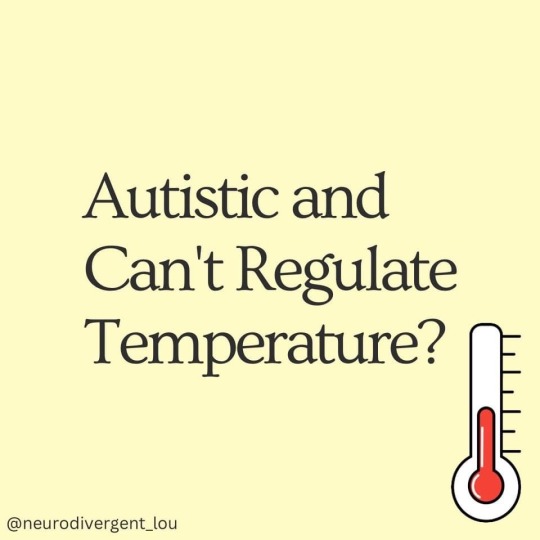
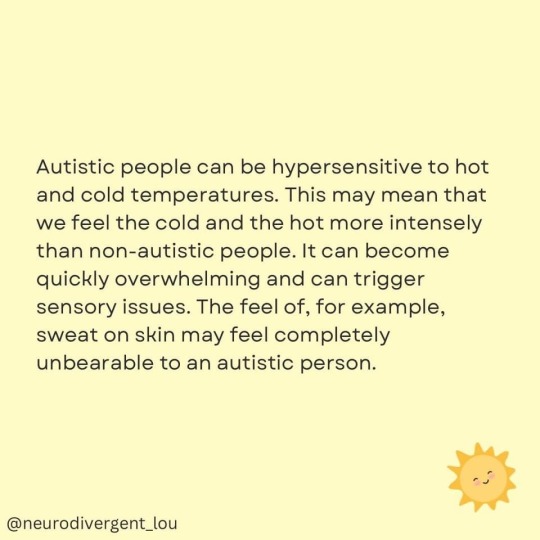
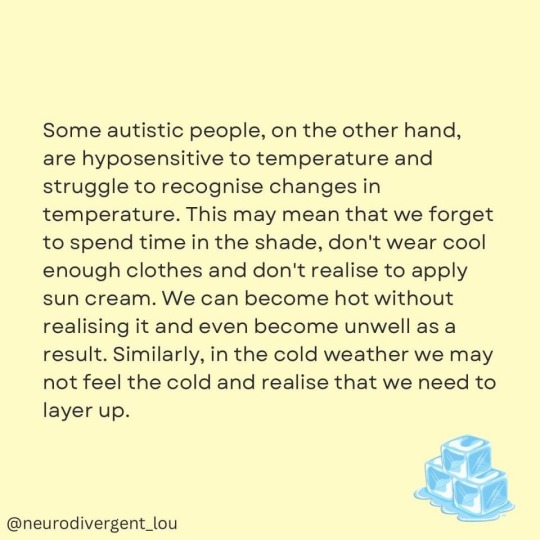
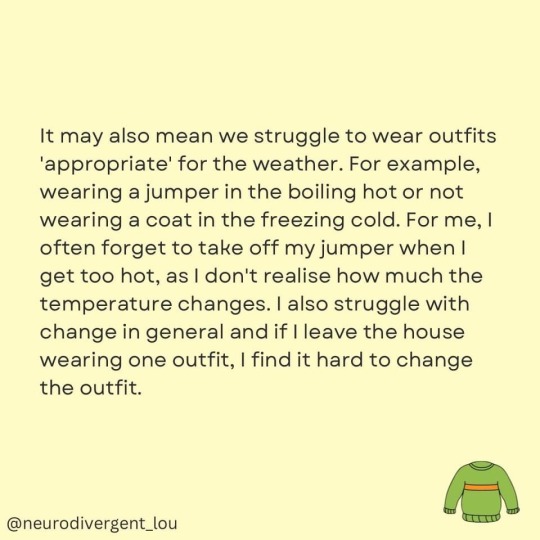
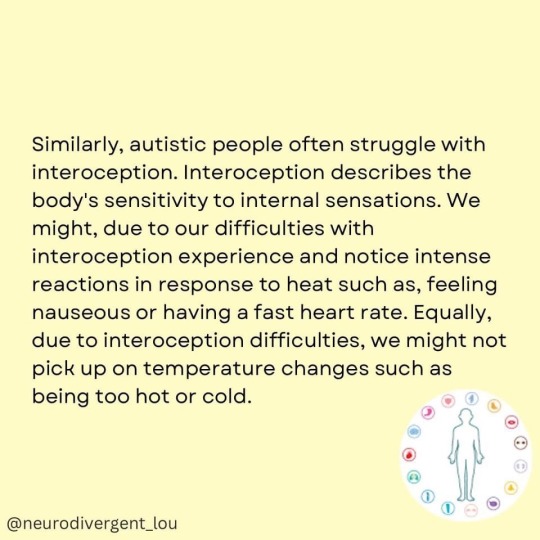
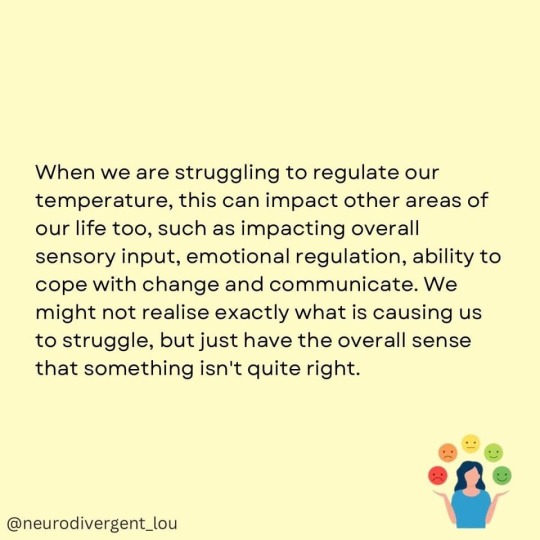
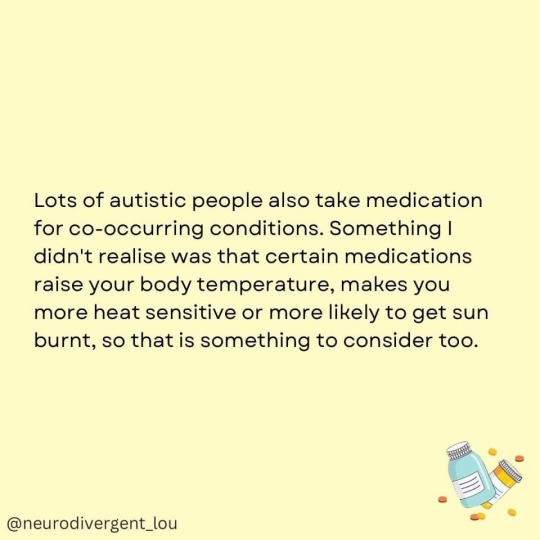
Neurodivergent_lou
283 notes
·
View notes
Text
A while back, this post happened and I mentioned an excessively detailed response, and here it is, presenting a (more or less) physiologically reasonable process for the entire function and breakdown of Garak's implant in “The Wire”. This breaks down into three main parts: how the implant is supposed to function, what went wrong, and how it's fixed. I'll add a TLDR as well. There's a lot of assumptions made (namely that Cardassian physiology is more or less functioning like Earth mammalian physiology), determinations that characters don't necessarily know exactly what they're talking about, simplification of exceedingly complicated things, and terminology.
Before we get into headcanoning and speculating, let's cover what we know of the implant from the episode. The implant is situated in the “postcentral gyrus and has filaments that connect it to [the] entire central nervous system” and “was designed to stimulate the pleasure centres of [the] brain to trigger the production of vast amounts of natural endorphins” in case of torture. The first symptoms include clammy skin*, dyspnea (difficulty breathing), miosis (contracted pupils), high level of pain (specifically a headache, although potentially in other areas as well), and “some type of seizure”. Later on, there is mention of deterioration of the “cranial nerve cluster”, bradycardia (a slow heart rate, likely since treatment was a stimulant and cardiostimulator), and toxins accumulating in lymphatic tissues caused by an altered leukocyte molecular structure. After turning off the implant, synthetic leukocytes are required to cure lingering effects (the aforementioned toxins and altered leukocytes). (*Clammy skin refers to cool, pale, and sweaty skin, so if one is looking at a purely canon view, this does mean that Cardassians sweat. However, the idea of ectothermic Cardassians that thus don't sweat is pretty common, so it's possible that one could interpret this as thus referring solely to cool and pale skin, or, since Bashir is basing his assessment on solely visual examination, just paleness, likely in the mucous membranes of the conjunctiva and gum tissue)
Let's break this down a little, starting by getting some of the nonsense out of the way. Endorphins (which are by definition natural) aren't produced by any 'pleasure centers' of the brain, they come from the pituitary gland; 'cranial nerve cluster' is essentially meaningless (although I suppose that the brain could be considered a nerve cluster); and, unlike the episode suggests, leukocytes aren't molecules – they're cells and thus made out of countless molecules. Moving onto breaking down terminology that has actual meaning, the postcentral gyrus is a part of the brain (roughly the middle top) that contains the primary somatosensory cortex, which helps the brain know where sensory signals are coming from, including pain. So, good job writers, you did mention a brain region associated with pain sensing! The central nervous system (CNS) is the brain and spinal cord. Endorphins are a type of what are called endogenous opioids, opioids produced by the body itself. They have more or less the same effects as other opioids like morphine, so that's probably the best starting point for research on side-effects and withdrawal symptoms for anyone who wants to look into that. Most relevant is that they're an analgesic (pain killer) and increase the production and release of dopamine, the “happy chemical”. Lymphatic tissues are just the tissues of the lymphatic system, which is kind of like an extra liquid collection system and aids in immune responses by producing, processing, and storing immune cells (and fat transport, but that's extraneous here). Leukocyte is a generic umbrella term equivalent to 'white blood cell' and thus contains a lot of different types of cells doing different things. Dr. Bashir really should have been more specific there.
That's what we get from canon, so from here on out it's pure headcanoning based on science. Let's tackle the first part: how does the implant work in the first place?
If the implant's purpose is to make one immune to pain, it needs to accomplish two main things: first, detect when pain is happening, and second, do something to stop that pain from being sensed. We're going to need to cover some basic nociception (pain sensing) here. The first step in pain detection is that a neuron called a nociceptor detects something pain causing, namely temperature (fun fact: spicy foods feel hot because some chemicals in them activate heat pain nociceptors in the mouth), chemicals (particularly chemicals released by damaged cells), and getting damaged itself. The nociceptor then releases a neurotransmitter (chemical that neurons use to communicate with each other) called Substance P. Substance P is then picked up by a secondary neuron in the spinal cord that sends the message of pain up to various parts of the brain that spread the message around and eventually cause effects, include the actual sensing of the pain, telling the brain where the pain is (that's where the primary somatosensory cortex and postcentral gyrus come in), and inducing the fight-or-flight response. One part of the brain that gets the 'we're hurting!' signal and sends a message that eventually results in the release of endogenous opioids like endorphins, which in turn prevent Substance P from being released, thus cutting off the pain signal, as well as do the other opioid things.
To accomplish the first task of detecting pain, the implant most probably has sensors for Substance P. These would probably be those filaments connecting to the entire CNS – since the Substance P is released in the spinal cord, these sensing filaments kind of need to be covering it all to detect any incoming Substance P. The second task of cutting off that pain signal then functions simply by flooding the body with endorphins (and probably other endogenous opioids). These endorphins could be sourced in three ways: via some sort of storage within the implant, via the implant causing the body to produce more, or via the implant itself producing and releasing more. Having enough stored for constant release for multiple years seems unlikely, so we'll scratch off that possibility. Garak's dialogue does suggest that the implant causes the body itself to produce more endorphins, but I'm going to go with the third option because we're going to need truly excessive amounts of endorphins to fully kill off pain signals (and it'd likely be hard to get the body to produce that much) and because it makes it easier to explain what might go wrong.
And speaking of what might go wrong, let's now look at that. The first noticeable symptoms are pale/clammy skin, dyspnea, extreme pain, and miosis. Miosis is caused by opioids, and would thus be induced by the implant and extreme pain. The pale skin and dyspnea are consistent with the heart not pumping enough blood to all the tissues. Other related symptoms include fatigue and anxiety, which are consistent with Garak's behavior. This is also consistent with the later bradycardia. This sort of heart issue is generally associated with heart attacks and other failures of the heart muscles itself, but could be caused by anything interfering with the heart's function. Since heart rate is largely controlled by the CNS, disruptions to it (such as by, say, a malfunctioning cranial implant), could induce these symptoms. We later learn that there is also deterioration of neural tissue (or at least that's how I'm interpreting Garak's 'cranial nerve cluster' comment) and damage to the lymphatic system due to toxins caused by altered leukocytes. It seems logical that these toxins are also responsible for the neural tissue deterioration and the CNS effects on the heart.
The next obvious question then is what are these toxins? Here comes the most speculative bit: the toxins are an autoimmune response caused by the implant producing malformed endorphins that bind to and affect the receptors of mature cytotoxic T-cells and cause them to bind to Class I MHC molecules in the absence of foreign antigens and result in the destruction of healthy cells. That's a lot of terminology and concepts that I just threw out, so let's break all that down. Malformed endorphins would be just what they say on the tin – after working for so long, the implant starts making making mistakes when producing and releasing the endorphins. Cytotoxic T-cells are a subtype of a subtype of leukocytes that work by destroying any cells presenting the 'red flag' that they've been invaded: a bit of something foreign to the body held out by what are called Class I MHCs, which are found on all cells. They sometimes accidentally respond and bind to plain Class I MHCs, thus resulting in an autoimmune reaction wherein the immune system attacks the body it's supposed to be protecting. Normally, these malfunctioning cytotoxic T-cells are taken care of before they mature and actually go to work, but if mature T-cells are being modified (there's your 'altered molecular structure of leukocytes'), the main bulwark against this type of autoimmune attack is side-stepped. And thus we have a malfunctioning implant killing Garak, and being able to continue to do so even when deactivated – the modified cytotoxic T-cells are still there, doing damage, even if no more new ones are being created.
This brings us to the third and final part: aside form turning off the implant, how are all its ill effects stopped? The big issue here would be the modified cytotoxic T-cells still running around, killing cells. There is one other mechanism for stopping self-attacking T-cells: regulatory T-cells. In the proposed situation, the body just doesn't have enough circulating regulatory T-cells to take care of the modified cytotoxic T-cells. Thus, the synthesized Cardassian leukocytes are specifically Cardassian regulatory T-cells that then help get rid of all the dangerous cytotoxic T-cells, thus stopping the toxins they produce from continuing to damage and kill tissues and effectively curing Garak.
So that's a lot, covering the very complicated and not entirely understood areas of neurology and immunology, so there's an amount of oversimplification, and I wouldn't be surprised if I mixed up or missed something that completely topples this entire thing.
But the TLDR is: Garak's implant makes opioids, but then it malfunctions and starts to instead make toxins that cause Garak's body to attack itself. Turning off the implant stops the production of the toxins, but Garak's body is still attacking itself until the synthesized Cardassian leukocytes are administered and fix things.
#Star Trek#DS9#The Wire#Star Trek doesn't understand biology#Elim Garak#Garak#Cardassians#Trek biotech#long post#addiction#opioids#I should probably proofread this first but eh#Also there's the blood-brain barrier that would probably be involved here but we'll just say it's passed by for some reason#Tricorder log
35 notes
·
View notes
Text
Multiple Sclerosis is a chronic disease that causes the immune system to attack the body’s nerve fibers. It affects people between the ages of 20 to 40 and is usually attributed to a mix of genetic and environmental factors. While the disease itself is not fatal, patients tend to succumb to complications in later stages, making the average life expectancy of Multiple Sclerosis patients a few years shorter than that of a healthy person. Let’s take a closer look at how MS manifests and what patients should know about disease progression and life expectancy.
Understanding Multiple Sclerosis
Multiple Sclerosis (MS) is a chronic inflammatory condition of the central nervous system (CNS). It is an autoimmune demyelinating disease, which means the immune system mistakenly attacks normal tissues — in this case, the myelin or protective covering around nerve fibers. This leaves scarred tissues or lesions in multiple areas, disrupting electrical impulses throughout the body. When the myelin sheath is damaged, nerve impulses slow or even stop, causing neurological problems. Common early symptoms of Multiple Sclerosis include double or blurred vision, tingling or weakness in the body, tremors, and unsteady gait. Timely treatment is essential to slow disease progression and keep symptoms in check.
Multiple Sclerosis progression
Multiple Sclerosis can be classified into three main types based on disease progression. A patient may test for one or more of these at different points in time, depending on the symptoms and the rate of degeneration in the central nervous system.
Relapsing-remitting Multiple Sclerosis: Around 85% of Multiple Sclerosis patients experience this type of MS. It involves periodic relapses, caused due to an irritation or inflammation of the nerves in the CNS. During a relapse, the patient’s symptoms worsen, and this can last anywhere between several days to several weeks. After each relapse will come a period of improvement, lasting several weeks or even months, during which symptoms may even improve slightly.
Primary-progressive Multiple Sclerosis: Around 15% of Multiple Sclerosis patients will experience primary-progressive MS. Essentially, instead of relapses and recovery periods, the patient’s symptoms will gradually worsen right from the onset of the disease.
Secondary-progressive Multiple Sclerosis: Around 15% of patients who have relapsing-remitting MS will experience secondary-progressive MS. Essentially, over time the disease symptoms will start to steadily decline rather than relapse and recover. This usually happens within 10 years of the initial MS diagnosis.
Life expectancy with Multiple Sclerosis
One of the key questions that patients ask at the time of diagnosis is — what is the life expectancy for someone with Multiple Sclerosis? In general, the lifespan of an MS patient is about five to 10 years less than that of the healthy population. This is not due to the disease itself, but from complications that arise as the disease progresses. Most patients with advanced Multiple Sclerosis will experience issues related to mobility, swallowing, breathing, or a combination of all three. Some of the causes of death in the late stages of MS include:
Chronic bed sores from prolonged immobility
Chronic urinary tract infections such as urogenital sepsis
Bacterial / Aspiration pneumonia
Choking due to dysphagia (trouble swallowing)
Other causes of death for Multiple Sclerosis patients include:
Heart disease, which can be linked to unhealthy weight gain from not moving enough
Lung disease owing to weakened chest muscles
Suicide owing to the frustration of illness or as a result of depression or anxiety
Factors that affect Multiple Sclerosis prognosis
While Multiple Sclerosis life expectancy for any one patient depends on their unique medical history and symptom patterns. Certain factors are more favorable than others for a longer life. Some of these factors include:
Getting diagnosed at a younger age
Only one CNS system being involved at disease onset
Having a low rate of symptom relapses per year
Having a long interval between the first and second CNS attack
Complete recovery from the first attack
Low disability in the first two to five years after diagnosis
More sensory symptoms than motor-related symptoms
Later cerebellar involvement
Gender — Female patients are more likely to live a longer life
Treatment for Multiple Sclerosis
While there is no cure for Multiple Sclerosis, treatments can slow disease progression, keep symptoms in check, and lengthen the recovery period between relapses. The sooner a patient starts treatment, the more effectively CNS damage can be contained, leading to fewer debilitating symptoms and a better quality of life in later stages. In addition, Physiotherapy, Occupational Therapy, and Speech Therapy help to improve day-to-day functionality and optimize quality of life. Some of the lifestyle changes that MS patients can make to stay healthy include:
Getting enough exercise, with at least 150 minutes of moderate aerobic exercise per week
Performing exercises, specified by a physiotherapist, to strengthen limbs and improve muscle control
Eating a diet rich in leafy green vegetables, whole grains, and lean protein
Cutting out tobacco, alcohol, and caffeine
Getting regular check-ups for blood sugar, cholesterol levels, and other vitals so that the doctor can detect any abnormalities in time
Staying cool to avoid symptom flare-ups
Doing cognitive exercises which help in brain function, memory, and combatting attention deficit
Having a regular sleep schedule
Managing stress through activities like journaling or meditation
Seeking out a counselor in case of depressive or suicidal thoughts
A Multiple Sclerosis diagnosis doesn’t have to be viewed as a death sentence. As treatments continue to evolve, Multiple Sclerosis life expectancy is on the rise and so is the quality of life. A healthy, active lifestyle, and an appropriate treatment plan will ensure that patients retain as much functionality as possible as the disease progresses. In addition, the patient must keep a close eye on their symptoms and consult the doctor at once if there is any change. This will help to tailor the Multiple Sclerosis treatment plan for maximum benefit.
https://www.nhs.uk/conditions/multiple-sclerosis/
https://library.med.utah.edu/kw/ms/prognosis.html
https://www.webmd.com/multiple-sclerosis/features/ms-life-expectancy
FAQs
Does Multiple Sclerosis shorten life expectancy?
The life expectancy of someone with Multiple Sclerosis is slightly reduced. The average lifespan of 25 to 35 years is often made, once diagnosed with Multiple Sclerosis.
Does MS get worse with age?
Over time, symptoms of MS stop coming and going, but begin getting steadily worse. This change can happen shortly after MS symptoms appear, or it may even take years or decades.
Is Multiple Sclerosis always fatal?
No, Multiple Sclerosis itself is rarely fatal.
At what age does MS get bad?
The disease manifests differently in every person. When it comes to age, most people are between 20 and 50 when they’re diagnosed.
Will I end up in a wheelchair with MS?
No, Many people living with MS are able to walk unassisted, while a smaller number need the help of a mobility aid.
How can I stop my MS from progressing?
While there is no cure, there are lifestyle changes that can slow progression of the disease. These include sticking to a treatment plan, eating a healthy diet, avoiding smoking, and getting restful sleep.
What should I avoid with Multiple Sclerosis?
Some common triggers for patients with Multiple Sclerosis that can be avoided include stress, heat, childbirth, certain vaccines, a Vitamin D deficiency, lack of sleep, and a poor diet.
How fast does MS progress without medication?
Treatment, including medication, can slow down the disease progression in MS. Researchers have found a 7.5-year difference between MS patients who took medication and those who didn’t.
What is the most aggressive form of MS?
‘Fulminate MS’ is the most rapidly progressive disease with severe relapses as early as within 5 years of diagnosis. It is also known as ‘malignant MS’ or ‘Marburg MS.’ This form of MS may need to be treated more aggressively than other forms.
Can you have MS for years and not know it?
A benign form of MS that can’t be identified at the time of initial diagnosis, can take as long as 15 years to diagnose. The course of the disease is unpredictable.
8 notes
·
View notes
Text
did anyone else with hypersensitivity-related sensory issues not relate to the narrative that they’re about “being unable to filter things out” or “always being aware of everything” at first because you were/are just emotionally numb to it all until like a major fight-flight trigger comes up? so you are actually constantly filtering stuff out/ignoring stuff, it just... doesn’t help?
like... if i actually sit down and think about it... these are the sensory problems i had when i woke up this morning:
very hungry (i noticed this one lol)
daylight too bright
stiff back
general tiredness
itchy scalp
floor feels bad (i’m actively trying to pay attention today so i’ve put on socks)
ulcer on the side of my tongue (i’ve accidentally bitten it and i keep resting it between my teeth anyway on autopilot)
things either too quiet or too loud, either way sound is not being kind
a little bit too hot
mild dizziness from the combination of hunger, tiredness and heat
i’ve put headphones in bc music helps, but having stuff in my ears doesn’t feel... *great* right now
like, this isn’t quite enough to give me a meltdown/shutdown/whatever, but it doesn’t feel good. every one of these is having a negative effect on my mood and energy, but i also literally can’t think focus on all of them at once. i’m not practiced in being aware of stuff because my default assumption is kind of that i can’t do anything about it or have to just “deal with it”. which is obviously not true. but it’s an easy assumption to make when you’re surrounded by people with no sensory issues
#actuallyautistic#sensory processing disorder#yes i know this is something i need to work on#but it's pretty ingrained atm#i even like... find myself defaulting to sitting in positions that hurt and i KNOW they hurt but i just do them anyway
11 notes
·
View notes